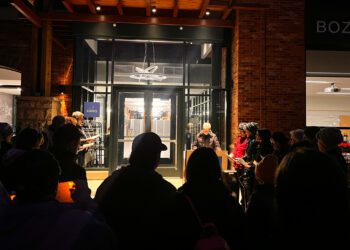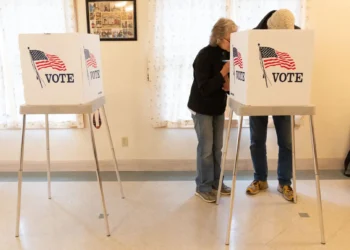Local businesses struggle to staff amid pandemic guidelines
Editor’s note: Tracing a pandemic is a complicated task. This is the second in a series in which we uncover the intricacies of this pandemic and how it is affecting the Big Sky community.
By Mira Brody EBS STAFF
BIG SKY – In Big Sky, it’s often difficult enough to find reliable, long-term staff due to the cost of living and seasonal nature of a ski town. During a pandemic, businesses have found it near impossible, and it’s forcing many to shut their doors if only temporarily.
One such business is Brothel Bikes Pub. In June, a bartender at the pub tested positive for COVID-19, leading the health department to contact and quarantine five other bartenders who were known close contacts.
Left without a majority of his staff, pub owner Chaz Boutsikaris made the decision to close down for three weeks, putting him out of business through the Fourth of July weekend. He closed not because the health department forced him to, but because he didn’t have enough workers to feasibly stay open.
“The reality is [in Big Sky] for the most part everybody runs in the same circles. Everyone goes to the same bar, eats at the same places,” Boutsikaris said. “You just feel like it’s the nature of the game, it’s the nature of a small town.”
Boutsikaris estimates the revenue he lost during that time was close to $20,000.
“Three weeks is rough right in the middle of the season, on top of the other closure,” Boutsikaris said, referring to the stay-at-home order that occurred for most of the service and entertainment industry back in March before the state’s phased reopening began.
Alex Omania opened the Lotus Pad in 2007 and has been in the service industry for well over 30 years. She closed her doors on three separate occasions for a week each, once over the Fourth of July, a weekend that in a normal year draws a lot of business.
March, too, is when she says she makes a large portion of the income necessary to keep the restaurant open through shoulder season. Each time she closed, it was her personal decision as a business owner, and for the health and safety of her employees and patrons.
Matt Kelley, health officer for Gallatin City-County Health Department, says that COVID-19 tests are issued based on whether they provide the county and state with useful information. Those whom the health department asks to quarantine but not test are not counted in county COVID-19 case numbers. He says the number of those in that category are probably very small.
“You’re not counted as a case unless it’s with a confirmed laboratory report,” Kelley said. “We might not be making them go in and get a test result because it wouldn’t change what were asking them to do, especially if they don’t have symptoms.”
Although he says the county is doing OK with accessible rapid tests right now, the department is also trying to avoid a system overload, much like the one in July when massive surveillance testing resulted in test results taking up to a month to return to patients. It’s a benefit versus cost situation, says Kelley.
“We are testing people where we see public value for that testing,” he said. “Where there’s not a lot of public health value for it, we won’t because we don’t want to overtax our system. We went through a problem in July when we had too many tests, and we don’t want to have that happen again.”
As for the recent change in guidelines issued by the Centers for Disease Control and Prevention that suggests asymptomatic individuals not get tested for COVID-19 at all, Kelley says that directive doesn’t affect the health department’s efforts on a county level.
“We have good turnaround on tests right now,” Kelley said, adding that while the county currently has enough tests, past shortages were an issue. “We are constantly cognizant of the potential to overwhelm the system.”
Meanwhile, patients are asked to quarantine even as businesses struggle to keep enough staff to stay open. Lotus Pad is currently closed two days a week, solely because they don’t have the workers to keep the restaurant open full time, Omania says, something she’s never experienced in the 13 years she’s been open in Big Sky. Her staff has been flexible and hardworking, but she says she simply can’t afford to work everyone seven days a week.
Another attributing factor to the staffing shortage in Big Sky is how difficult travel restrictions have made it to acquire J1 visas. Although she’s unsure if she’ll be able to get J1s this year, Omania hopes to get at least five similar work visas approved for winter so she can bring more staff in and remain open for business.
“A restaurant is heavily dependent on cash flow,” Omania said. “If you don’t have money, there’s constantly money leaving the bank and you’re constantly paying for things. When you don’t have cash flow, you’re getting into trouble.”
Omania believes in personal reasonability but this dance, she says, has been frustrating and is unsustainable for her business.
“You know what I’m not going to do, I’m not going to just keep opening and closing like we’ve been doing,” she said. “When we close to take-out only, we lose like a third of the business. It’s hard, I can’t imagine having to do that all winter and having to pay rent, too.”
Boutsikaris, for his part, is so far making ends meet. He says that without his regular patrons he’d be less lucky as a bar owner in Big Sky.
“We’re paying the bills, people are showing up, we’re having decent nights, but we’re being cautious,” he said. “Under the circumstances honestly I can’t complain. It’s been a rough year but I’m so grateful that we have people that are still showing up.”











